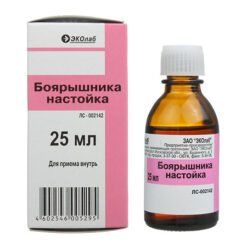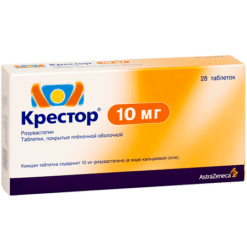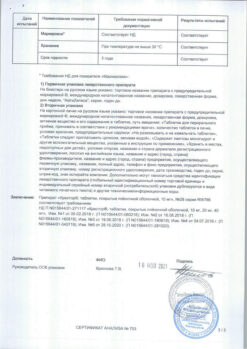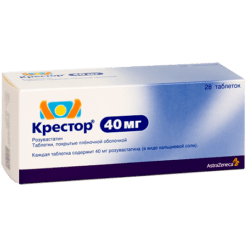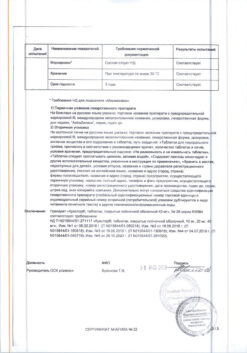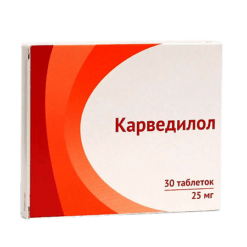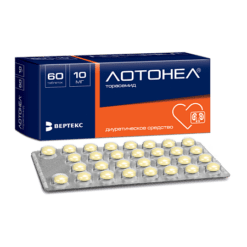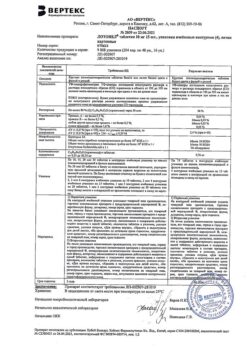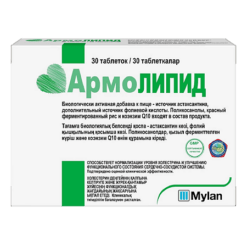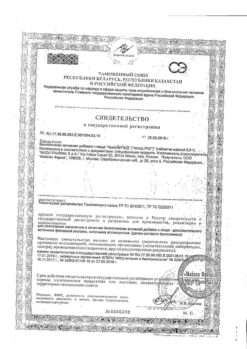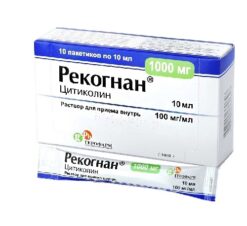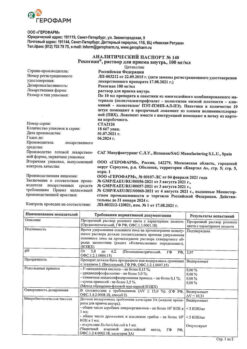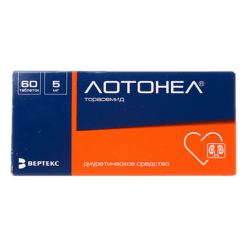No products in the cart.
Nebivolol tablets 5 mg, 14 pcs.
€1.00
Out of stock
(E-mail when Stock is available)
Description
Nebivolol is a III generation cardioselective beta1-adrenoblocker with vasodilator properties. The active substance is a racemate consisting of two enantiomers: D-nebivolol and L-nebivolol. D-nebivololol is a competitive and highly selective blocker of β1-adrenoreceptors; L-nebivolol has a mild vasodilator effect due to modulation of vasodilatory factor (NO) release from vascular endothelium.
Nebivololol lowers HR and BP at rest and at exercise, decreases left ventricular end-diastolic pressure, decreases DFS, improves diastolic heart function (decreases filling pressure), increases ejection fraction; causes antianginal effect in CHD patients.
The hypotensive effect is also due to decrease of renin-angiotensin system activity (does not directly correlate with changes in plasma renin activity).
The antiarrhythmic action is caused by the suppression of pathological automatism of the heart (including in the pathological focus) and the slowing of AV conduction.
Sustained hypotensive effect occurs after 1-2 weeks of regular use of the drug, and in some cases – after 4 weeks, the stable effect is noted after 1-2 months.
Indications
Indications
Active ingredient
Active ingredient
Composition
Composition
Tablets are white or almost white, round, flat cylindrical shape, with a bevel and a cross-shaped groove on one side.
1 tablet nebivololol hydrochloride 5.45 mg, which corresponds to the content of nebivolol 5 mg
Excipients:
Lactose monohydrate – 139.91 g,
corn starch – 46 mg,
cellulose microcrystalline – 16.1 mg,
croscarmellose sodium – 13.8 mg,
hyprolose (hydroxypropyl cellulose) – 4.6 mg,
polysorbate 80 – 2.3 mg,
magnesium stearate – 1.15 mg,
colloidal silicon dioxide – 0.69 mg.
How to take, the dosage
How to take, the dosage
Adults for oral administration – 2.5-5 mg/day in the morning. The optimal effect develops after 1-2 weeks of treatment, and in some cases – after 4 weeks. If necessary, the daily dose is increased to 10 mg/day.
For patients over 65 years of age, the starting dose is 2.5 mg/day. If necessary, the daily dose can be increased to 5 mg.
Interaction
Interaction
Concomitant use with class I antiarrhythmic drugs, amiodarone may increase the negative inotropic effect and inhibition of AV conduction.
In concomitant use with calcium channel blockers (verapamil and diltiazem) the negative inotropic effect and suppression of AV conduction are increased.
In case of intravenous administration of verapamil with nebivololol, there is a risk of cardiac arrest (concomitant use is contraindicated).
In concomitant use of nebivololol with hypotensive agents, nitroglycerin or slow calcium channel blockers, severe arterial hypotension may occur (special caution is required in combination with prazosin).
Concomitant use with sympathomimetics suppresses the pharmacological activity of nebivololol.
Concomitant use with anesthetic agents may suppress reflex tachycardia and increase the risk of arterial hypotension.
Concomitant use with tricyclic antidepressants, barbiturates, phenothiazine derivatives may increase the antihypertensive effect of nebivolol.
Concomitant use with cimetidine may increase plasma concentrations of nebivololol.
Concomitant use of nebivololol with drugs that inhibit serotonin reuptake or other agents biotransforming with CYP2D6 enzyme increases nebivolol plasma concentrations and slows down nebivolol metabolism, which may increase the risk of bradycardia.
The symptoms of hypoglycemia (tachycardia) may be masked when nebivololol is coadministered with insulin and oral hypoglycemic agents.
Special Instructions
Special Instructions
With caution, Nebivolol should be used in patients with renal failure, diabetes mellitus, thyroid hyperfunction, history of allergic diseases, psoriasis, COPD, grade I AV blockade, Prinzmetal angina, and in patients older than 75 years.
The withdrawal of beta-adrenoblockers should be done gradually over 10 days (up to 2 weeks in patients with CHD).
At the beginning of treatment, BP and HR should be monitored daily.
The effectiveness of beta-adrenoblockers is lower in smokers than in nonsmokers.
Nebivololol has no effect on glucose levels in diabetic patients, but certain signs of hypoglycemia (tachycardia, palpitations) caused by the use of hypoglycemic agents may be masked by the effects of nebivololol.
When it is necessary to use nebivololol in patients with psoriasis, the expected benefit of therapy and the possible risk of psoriasis exacerbation should be carefully evaluated.
Beta-adrenoblockers should be used with caution in patients with increased thyroid function, due to the fact that tachycardia may be alleviated under the influence of beta-adrenoblockers.
Nebivololol may increase symptoms of peripheral circulatory disorders.
Patients who wear contact lenses should be aware that the use of beta-adrenoblockers may decrease tear fluid production.
In surgical procedures, the anesthesiologist should be advised that the patient is taking beta-adrenoblockers.
Plasma glucose monitoring should be done once every 4-5 months (in diabetic patients).
Control of laboratory parameters of renal function should be carried out once every 4-5 months (in elderly patients).
Use in children is not recommended.
Contraindications
Contraindications
Acute heart failure; chronic heart failure in decompensation stage (requiring IV administration of drugs with positive inotropic action); severe arterial hypotension (systolic BP less than 90 mm Hg); CCSU, including sinoatrial block; AV-blockade of II and III degree (without artificial pacemaker); bradycardia (HR
; cardiogenic shock; pheochromocytoma (without concomitant use of alpha-adrenoblockers); metabolic acidosis; significant liver dysfunction; bronchospasm and bronchial asthma in anamnesis; severe peripheral vascular occlusive disease (intermittent claudication, Raynaud’s syndrome); myasthenia; depression; childhood and adolescence
Side effects
Side effects
The incidence of adverse reactions below was determined according to the following (World Health Organization classification): very common – at least 10%; common – at least 1%, but less than 10%; infrequent – at least 0.1%, but less than 1%; rare – at least 0.01%, but less than 0.1%; very rare – less than 0.01%, including individual reports.
Cardiovascular system (CVS): infrequent – bradycardia, worsening the course of CHF, delayed atrioventricular conduction, atrioventricular block, marked BP decrease, orthostatic hypotension, cardiac rhythm disturbances, cardialgia, progression of associated intermittent claudication, peripheral edema.
Nervous system disorders: frequently – fatigue, headache, dizziness, paresthesia; rarely – “nightmares”, decreased ability to concentrate, sleepiness, insomnia, depression; very rarely – hallucinations, fainting.
Senses: infrequent – visual impairment.
Respiratory system: often – shortness of breath; infrequent – bronchospasm, rhinitis.
The digestive system: often – dryness of the mucous membrane of the mouth, constipation, nausea, diarrhea; infrequent – vomiting, flatulence.
Skin: very rarely – exacerbation of psoriasis, photodermatosis, hyperhidrosis.
Allergic reactions: infrequent – skin itching, erythematous rash; very rare – angioedema.
Reproductive system: infrequent – impotence.
Overdose
Overdose
There are no data on cases of nebivololol overdose.
Symptoms: bradycardia, marked BP decrease, marked bradycardia, AV-blockade, cardiogenic shock, cardiac arrest, loss of consciousness, coma, nausea, vomiting, cyanosis, bronchospasm, acute heart failure.
Treatment: the patient is hospitalized and placed in the intensive care unit. Immediately it is necessary to determine the concentration of glucose in the blood. Gastric lavage, administration of activated charcoal, maintenance of cardiovascular function, monitoring of heart and lung function parameters, control of circulating blood volume and diuresis.
If necessary, a complex of resuscitation measures is performed.
The effects of beta-adrenoblockers can be neutralized by slow intravenous (IV) administration of isoprenaline at an initial dose of about 5 mcg/min or dobutamine at an initial dose of about 2.5 mcg/min. If bradycardia is severe, 0.5-2 mg of atropine is administered by IV, and a transvenous pacemaker may be instituted if there is no positive effect.
In case of heart failure, treatment begins with administration of cardiac glycosides and diuretics, in the absence of the effect it is advisable to administer dopamine, dobutamine or vasodilators. In bronchospasm, IV stimulators of β2-acrenoreceptors are used. In ventricular estrasystole – lidocaine (Class IA antiarrhythmic agents should not be administered).
Similarities
Similarities
Additional information
| Weight | 0.010 kg |
|---|---|
| Shelf life | 2 years. |
| Conditions of storage | Store at a temperature not exceeding 25 ° C. |
| Manufacturer | Kanonfarma Production ZAO, Russia |
| Medication form | pills |
| Brand | Kanonfarma Production ZAO |
Related products
Buy Nebivolol tablets 5 mg, 14 pcs. with delivery to USA, UK, Europe and over 120 other countries.


